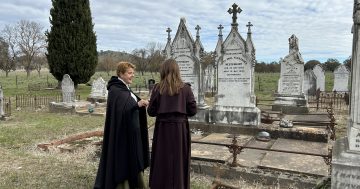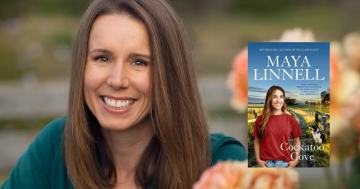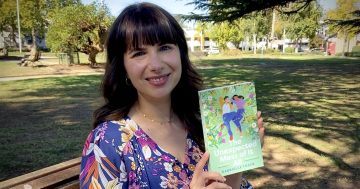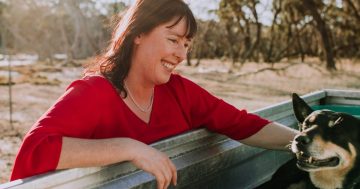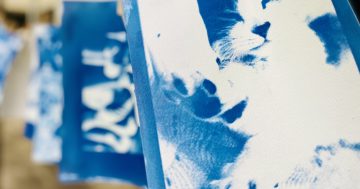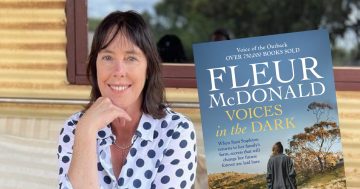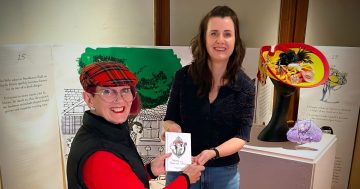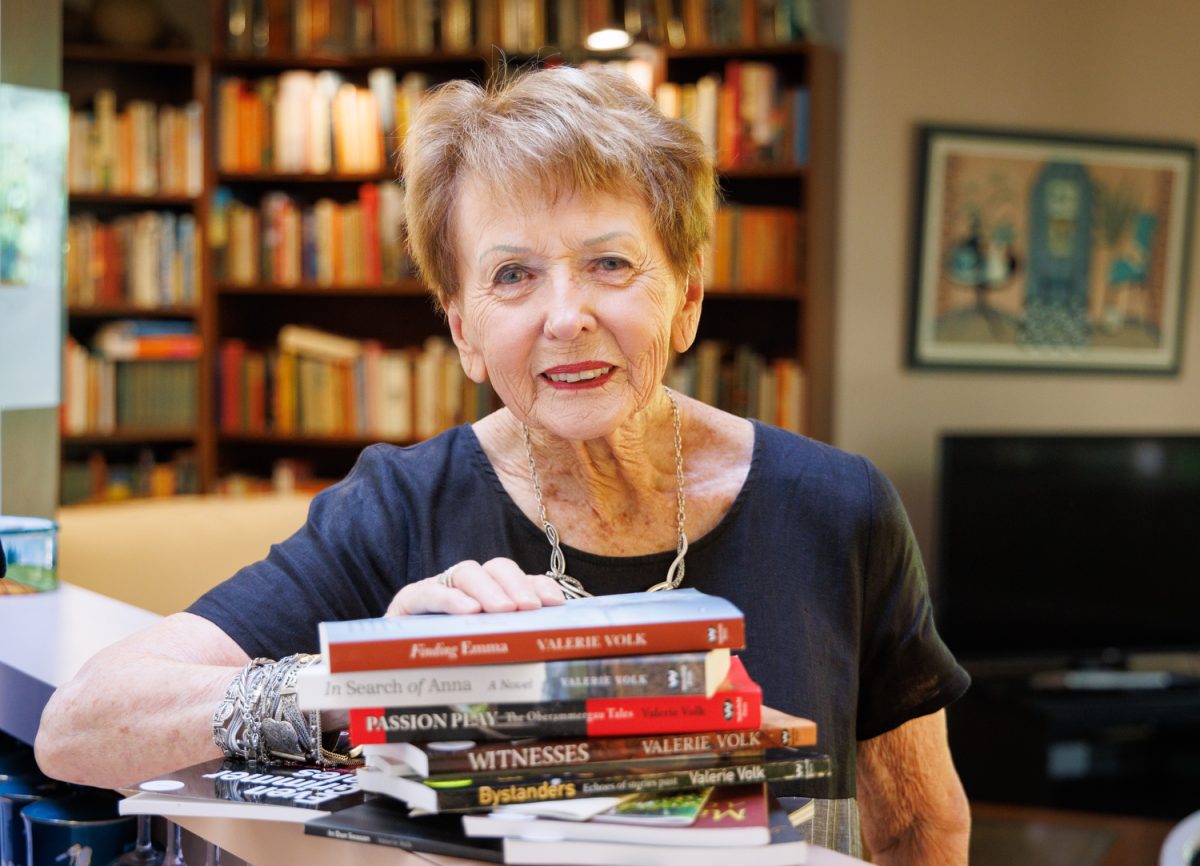
Author Valerie Volk pictured in her Adelaide home. She is launching her latest novel, set in the Riverina town of Jindera, in Albury and Jindera this month. Photo: Matt Turner.
Author Valerie Volk says her latest novel, Finding Emma, could be described as a work of “faction” as it combines elements of both fact and invention in the storytelling.
Valerie will return to Jindera, the beloved town of her childhood, on Thursday 18 April to launch the second of her books set in the small Riverina town and focused on the people of its early settlement.
Finding Emma is what she describes as a ‘companion’ novel to In Search of Anna, published by Wakefield Press in 2019.
The first book follows the story of Anna Werner (based on one of Valerie’s forebears) and presents a well-researched account of her long and perilous journey in 1889 from a small village in Germany to the farms of Jindera in search of her missing son.
Jindera is well known for its early pioneering heritage which has been beautifully preserved at the local museum. The arrival of many German Lutheran families who came from South Australia in the 1860s and onwards has been well documented; many descendants still live in the region.
In Valerie’s new book, the spotlight is shone on a minor character from the first book, Emma – now an old woman and domineering, cold and difficult to love. But she has not always been so and she turns to her journals to rediscover her old self and reclaim her future. Along the way she finds a woman whose strength of will and self-belief helped her endure and make a life for herself and her family.
Born in Melbourne and now living in South Australia, Valerie has a binding connection to Jindera. Grandparents, aunts and uncles and her parents all hail from the town and her strong association stems from many years spent there in school holidays.
Her mother’s parents farmed on “Quartz Hill”, four miles from the centre of Jindera, while her other grandfather was the town blacksmith for 50 years.
“All my family background is there,” she said.
“My parents, Ella Burdack and Fred Welzel, were both born in Jindera – some people may remember them. They moved to Melbourne in 1935 when they married but every school holidays we came to Jindera, sometimes for as long as six or seven weeks.
“We split our time very honourably between both lots of grandparents, as one had to,” she chuckles.
“I was absolutely immersed in Jindera to the point where I remember telling friends in Melbourne that really I lived in Jindera, I was just at school in Melbourne.”
Through many decades as a teacher, then a university lecturer and director of an international education program, Valerie has maintained a love for Jindera.
“Perhaps that’s why,” she speculates, “when I began my third life, post-retirement, as a writer, I wanted to recreate family background and the Jindera life of an earlier period.”
Valerie now resides in Adelaide and has published 12 books in all, including prose and verse novels, historical fiction, poetry collections, and travel books. She has won awards for her poetry, her novels, and her short stories, and describes herself as fascinated by people and their lives.
“I enjoy creating characters – it’s people who fascinate me and I guess I’ve always been a bit of a voyeur of people’s lives. I think my friends sometimes get concerned and I promise them that they will not appear as a character in one of my books!”
She said writing gave her the chance to live vicariously.
“It’s a chance to live many, many different lives and that is what I really enjoy. One life is just not enough!
“If you’ve got the chance to create these characters and live their lives – to create Anna and live her life, and to create Emma and live her life, this is what I really enjoy – this feeling.
“I become very involved in these people; I find myself thinking as them and contemplating how they would respond to situations.”
Valerie also defines both novels as ‘journey books’ although both are different as Anna experiences a geographical journey and Emma’s is more personal.
“I love journeys as a motive,” she said.
“The second book is also a journey book but it’s a psychological one. Emma doesn’t move very far outside Jindera at all and her passage is into her past by means of journals.
“She traces her life in Jindera through the journals that she’s kept from childhood and span 60 years from the 1860s to the 1940s. There is a background of so many quite momentous world events, living through the Victorian era, world wars, agrarian and industrial revolutions, strikes, depressions, all of this is there and it’s the background into her own psychological journey into what has made her the fairly difficult elderly woman that she has become.”
She describes the books as a mingling of facts on which the stories are based along with a healthy dose of invention.
While Emma is not a sequel it does pick up on a number of the same characters and becomes somewhat of a companion piece that follows on consecutively from the first story.
“The second book is really the honouring of a promise that’s implicit in the first book,” said Valerie.
“In the prologue of the first book the narrator stands in a stairwell and looks up at an assortment of old family photos on the wall. Although she’s searching for one particular woman, as her gaze passes another couple she comments, ‘One day these two will have their own story’.
“There’s sort of an implicit promise in the first book that there will be stories about others too.”
So, perhaps more will follow when Valerie again turns her eye to the sepia-toned prints of relatives long gone that adorn the stairwell wall of her Adelaide home.
Valerie will be in the Riverina promoting her book in both Jindera and Albury from 18 to 20 April.
She will launch Finding Emma at an evening event on 18 April at the Jindera Pioneer Museum, a poignant location as one of its main buildings was once owned by her uncle Arthur Burdack.
Valerie will then hold a talk at the Albury Library Museum on Saturday 20 April at 11 am to 12:30 pm.
Both books will be for sale at both events.
Attendance is free but tickets must be prebooked.
Jindera: Jindera Book launch: Finding Emma
Albury: Valerie Volk – Who am I? Finding Emma | Humanitix
You can read more about Valerie on her website.







